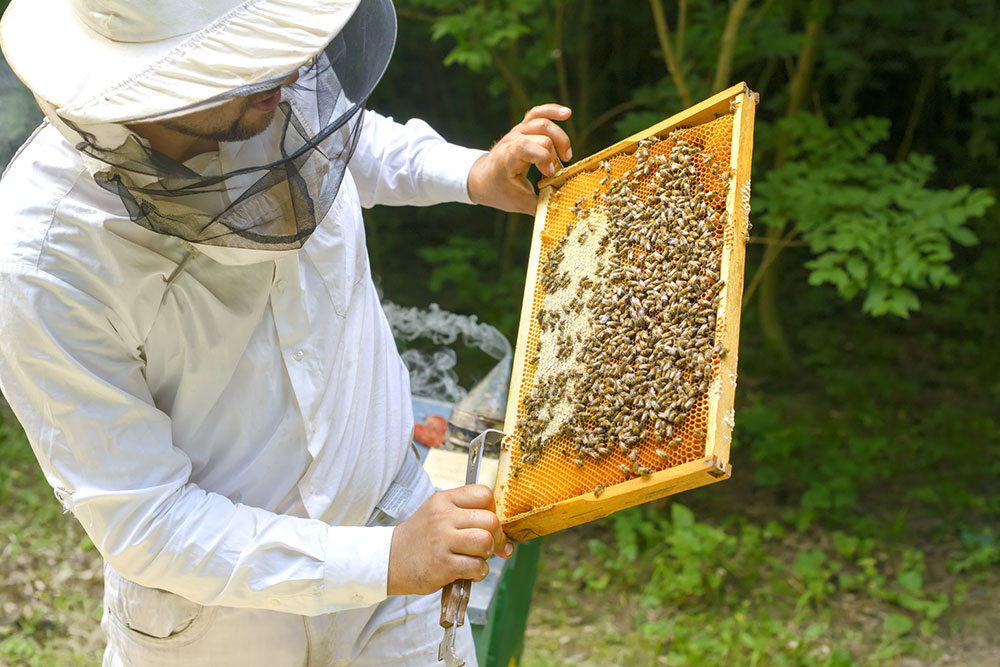6 Easy Ways to Get Rid of Carpenter Bees Naturally
Carpenter bees lay their eggs by the dozen into wooden surfaces before drilling them in for protection. In this way, they wreak havoc on wooden furniture, flooring, walls, and panels and cause unnecessary trouble. Many techniques can be used to remove these bees from the house. While chemical-driven solutions are easily available and more convenient, natural remedies are the way to go, as they are much more sustainable and non-toxic.
Boric acid
Boric acid is a common compound found in homes that has several benefits.

To make a homemade carpenter bee repellent, one must mix three parts of water with one part of boric acid in a spray bottle. This mixture can be sprayed onto the entrance of the holes created in wooden panels and other areas where carpenter bees or their eggs are present. The water-boric acid mixture is strong enough to exterminate bees within an hour. One can also use this solution for other DIY insect-removal projects.
Citrus-based spray
Citrus fruits like lemon, lime, grapefruit, and orange contain essential oils. Many scientific studies have found that these oils deter carpenter bees. While one can purchase pre-made citrus sprays online, making them at home is a more organic solution to the carpenter bee problem. A homemade solution also means individuals can control the ingredients and the number of citrus elements used.
The recipe for a citrus-based, homemade carpenter bee repellent is simple. All one needs to do is fill a spray bottle halfway with water and add about ten drops of citrus essential oil before securing the bottle and shaking it well. Just like boric acid, citrus oil is hyper-effective in ridding one’s property of carpenter bees. These insects tend to find the mixture of oil and water extremely pungent. That discomfort helps drive them away from the house or workplace.
Almond oil
Citrus oils aren’t the only oils one can spray on surfaces to rid a house or a workplace of bees. Almond oil is another natural compound used for clearing a whole host of insects from a place. Since its aroma is extremely repulsive to bees, many professionals also use almond oils as a potent weapon for carpenter bee removal.
Individuals can create their own almond-scented spray using the same method discussed for making citrus and boric acid-based solutions. All one needs to do is swap citrus essential oil or boric acid with an almond-based oil. Almond oil is lighter than citrus, so it floats above water when the two liquids are mixed. That’s why users will need to add an extra five to ten drops of almond oil to make the spray.
Vacuum cleaners
Vacuum cleaners are more than just regular dust and dirt-clearing devices. These machines are incredibly useful for driving insects, including carpenter bees, from the house or workplace. But here, the strength of the vacuum and the attachment matters. Models with strong suction power and a small attachment can vacuum the carpenter bees and their eggs out of their nest and every nook and corner in which they dwell inside a property. The vacuum bag will catch these bees, after which one can dispose of it far from the home.
While vacuuming is not the best solution, it is by far the easiest and least time-consuming one on this list. Unlike the various spray-based solutions mentioned, vacuuming does not waste precious minutes and hours before driving out the carpenter bees from a house. The lone downside to using vacuum suction is that it only works on nests that are new and not very deep. Vacuuming does not get any larvae either, so one will need to seal the nests up thoroughly after squeezing out the grown-up carpenter bees.
High-frequency sounds
Bees find high-intensity noises incredibly repulsive. So, to keep them away, one can play such sounds in the backyard. One must turn the volume up and place the sound source near the bees’ nests. The vibrations from the device will drive the bees out of their cozy nests in no time.
The obvious drawback of this carpenter bee control remedy is that individuals cannot play loud sounds whenever they like. Before proceeding with this operation, one will need to tell their neighbors why they are playing loud, booming music because the cacophony is bound to get on their nerves after a while.
Vinegar
Vinegar, like citrus oils, boric acid, and almond oils, has properties that make it intolerable for bees. People looking to clear their homes once and for all of the carpenter bees can mix vinegar in water before spraying the mixture in all the spaces and holes in and around the space. The recipe is similar to the ones discussed above, so one should have the vinegar spray ready quickly. Since vinegar is a staple kitchen ingredient, this homemade carpenter bee treatment will be useful.